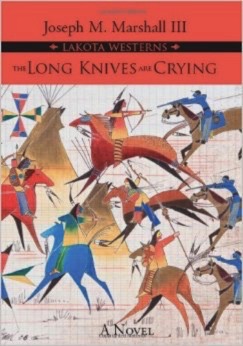The Long Knives are Crying
21/02/15 08:59
Joseph M. Marshall III, The Long Knives are Crying (Golden, Colorado: Fulcrum Publishing, 2008)

I have read many of Marshall's books in the past and have had the honor to hear him speak on one occasion, but somehow, I hadn't ventured into his works of historical fiction. It isn't a genre that generally interests me. But reading this novel has done a great deal to change my mind. Marshall's characters are bold and real and approachable. I find myself connecting to and understanding the story of this critical event much more clearly.
I grew up in Crow country, less than 150 miles from the Little Bighorn Battlefield. I visited it before it had become a tourist destination. I knew bits and pieces of the story and at least understood the general locations of the Reno battlefield, the encampment and the route that Custer's forces attempted to take in the poorly planned and executed attempt to bring the battle to the women, children and elders. But reading Marshall's novel made the events come alive for me in ways that I had not yet experienced.
I'm not much for reading the stories of battles, but I intend to pick up more of Marshall's historical novels. They carry the power to expand my world.